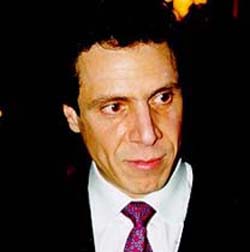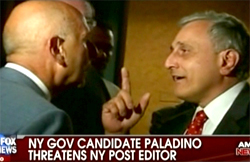Will Dicker's Book on Cuomo Tell the Inside Story?
 |
Andrew Cuomo |
 |
| Fred Dicker and Carl Paladino square off in Lake George. |
Of all the people who might write a biography of Gov. Andrew Cuomo, a reporter who figured in the drama of Cuomo’s life, at a pivotal moment, is the one who is doing it.
Fredric U. Dicker, state editor of The New York Post and one of Albany’s longest tenured reporters, is now writing a biography of Cuomo.
The book is to be published by HarperCollins in 2013, and a spokesman for Cuomo said the governor agreed to cooperate with Dicker in granting access to documents and live interviews.
HarperCollins is owned by News Corporation, which also owns the Post.
In broad strokes, Cuomo was an Albany Law School graduate who worked for his father’s election as governor and then, in his administration. He was a New York assistant district attorney and chairman of the New York City Homeless Commission before being appointed assistant secretary of Housing and Urban Development by President Bill Clinton and then to the cabinet post of HUD secretary for four years. He was elected as New York State Attorney General in 2006 and in 2010 he defeated Buffalo businessman Carl Paladino to become New York’s 56th governor.
The bare bones show a man suckled at the lifelong teat of government.
It will be up to Dicker to infuse the biography with drama, intrigue, mystery, plot, humanity, courage, or something to make it worth reading.
Will it be a serious attempt to reveal a personality, set against a backdrop of back-door, behind the scenes, dishonest, cesspool Albany politics that Dicker understands so well, or will it be a pure whitewash?
In September, 2010, Dicker attempted to interview Cuomo’s gubernatorial opponent, Paladino, outside a meeting in Lake George, using the confrontational style for which he is known. The subsequent explosion between the two men, caught on video, found the mainly Albany-based press corps spinning and making hay.
Paladino described the events leading up to the confrontation to the Reporter last week. He said, “Several days before (Dicker) baited me by sending his (New York Post) reporters to my daughter’s home, even after I had requested they respect the privacy of a 10-year-old child. … They caused her to cry …and stalked my 10-year-old daughter. That is wrong and unheard of. I would never do that to Cuomo or his children.
“A few days later, I saw (Dicker) at a conference near Lake George and he stuck a microphone in my face and actually hit me with the microphone in the face…. Obviously I was incensed and then I told him I would ‘take him out’ after the incident. That is a term I use regarding my baseball bat concerning cleaning up Albany…. We would have probably come to blows, but a gentleman from the Labor Union held Dicker back. Dicker said it was my ‘bodyguard.’ I do not have, never have had and never will have any bodyguards. I don’t need them.”
Watching the video, it is clear Dicker was almost as willing to fight as Paladino. At one point, as others intervened to keep the men apart, Dicker pushes a man larger than himself and says, “get out of my face.”
The nature of the press corps’ reporting and the context of it – the spin - seemed to be aimed at giving voters the impression that Paladino was an intemperate man who could veer wildly out of control at any moment, hence a man unfit for governor.
The confrontation could have been spun a number of ways: that Paladino was standing up to protect his family – which voters might have sympathized with; it could have spun as a chastisement of the intrusions of a greedy, undisciplined, intemperate press corps.
It could have been spun that two strong-willed men - one a candidate, the other, an important reporter - almost came to blows, standing up for what they thought was their honor.
But after that incident, the press reported Paladino as wild Carl or mad Carl, his ideas overshadowed by his willingness to become hostile.
That kind of self-righteous, stand your ground, not kowtow even to an important reporter, if reported differently, might have made him a hero, depending on who is doing the writing.
Which brings us back to Dicker’s book. Will his biography be a puff piece meant to help Cuomo’s career or an accurate reporting job, giving readers insight into a man who spent his whole life supported by government and how he has responded in turn.
At their confrontation, when Dicker was accused by Paladino aides of working for Cuomo, Dicker said pretty coolly, “I work for the Post.”
The biography may reveal more about Dicker than Cuomo.
It can be Dicker's entry into a world of serious biography – a work of significance, a graphic portrayal of the corrupt Albany culture and Andrew Cuomo within it, for better or worse, a flawed but noble or ignoble man.
Is Cuomo a man who is better than the culture he resides in, or is he part and parcel of it?
It is a culture Dicker understands.
Will he (with the governor’s cooperation) reveal the real world of Andrew Cuomo?